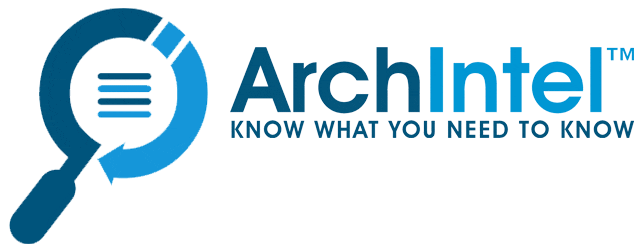ArchIntel recently hosted an expert panel during the AI in Competitive Intelligence Virtual Event on October 22nd, 2020. Featuring notable leaders within the competitive intelligence sector, the panel addresses how businesses can remain competitive in the marketplace. Additionally, the panel discussed emerging technologies that have the potential to change the way competitive intelligence is conducted.
If you missed the event, you can still access the OnDemand Footage of AI in Competitive Intelligence Virtual Event, as well as view upcoming opportunities on ArchIntel’s Event Page.
The panel hosted Suki Fuller, fellow with The Council of Competitive Intelligence Fellows; Fred Hoffman, interim chairman and assistant professor of Intelligence Studies of Mercyhurst University; and Arik Johnson, chairman of Aurora Worldwide Development Corp.

August Jackson, senior director of Market and Competitive Intelligence with Deltek, moderated the panel after delivering his opening address, where he analyzed the competitive landscape as technology continues to evolve.
Artificial intelligence (AI), machine learning (ML) and big data have transformed how businesses conduct competitive intelligence (CI) and how our stakeholders use the developed analyses. Businesses have integrated emerging technologies to remain competitive across the competitive landscape.
After Jackson introduced the panelists, Hoffman took the stage to address the most common ways technology will transform competitive intelligence. He stated that AI has, and will continue, to influence competitive intelligence in two ways.
Emerging technologies have influenced the way people think about competitive intelligence, and it has changed where businesses fit into the community based on their offerings. “You are able to look at your business, see what you can do better, then leverage technology to benefit your profession,” Hoffman said.

Johnson followed Hoffman’s comments, adding that the nature of competitive intelligence lies within choice. Hoffman argued that AI, and its application, can be applied in three different stages: to expand the funnel of choices, narrow the degree choice and simulation of the outcome of those choices.
“The one thing that I don’t believe AI will ever replace in the human analyst is creativity. An analyst is a form of art, they have aesthetic value. They have appreciation for what they do. Wherever the senses are titillated art is present. They have to be the most creative and imaginative people in the room,” Johnson said.
Fuller added that AI has made people more aware of their biases, as well as where they get their information. AI has helped verify sources faster, but practitioners have to be aware of what those sources are because of the presence of deep fakes and fake news.
“As a CI practitioner, due diligence may have taken you a week to verify the veracity of information. At the same time, you have to be aware of where your information comes from regardless of how it’s collected. You have to be aware of your biases. Just because it has been right in the past, doesn’t mean it will be right in the future,” Fuller said.

Jackson noted that in the beginning of the year, with the onset of COVID-19, the increase of AI algorithms were based on the world that existed before, like supply chain; however, as the world and people adapted to remote work, there was not a predictive algorithm to gauge that shift.
“We have a general misunderstanding of AI. AI mechanizes tasks faster than we can do as humans. Anywhere you have a repeatable task, you can integrate AI. There are simply some things that AI cannot do; however, there are narrow fields in which it performs extremely well,” Hoffman said.
Hoffman added that AI should be leveraged for those superior tasks, such as natural processing and collecting data. The misconception, he stated, is that people lack an understanding of what AI actually does, and how to use it effectively. If they understand AI and how to use it, practitioners will be able to quicken their operations and receive better results.
In regards to Hoffman’s comment, Johnson noted that there is a misconception that AI is a threat to the workforce. He added that there is also a misestimation of where AI is at within competitive intelligence. “People think we’re at the point where AI can be seamlessly integrated into competitive intelligence. In reality, we are only at the beginning of automation,” Johnson said.
Jackson posed the question of how ethical dilemmas have affected competitive intelligence, and how practitioners can combat those challenges. Hoffman stated that, to combat ethical threats, companies and competitive intelligence professionals must determine what the data says and who has access to that information and the aspects.

Fuller added that ethics revolves around where your sources are coming from. One of the other issues is that, when people use AI to scrape sites and images, they train a neuronetwork. The potential downside to this is that there could be a breach of a website, and you can gain information that is not publicly available.
“This is corporate espionage because it’s supposed to be private information; however, you won’t know if you crossed that line because AI will not tell you that it received records behind a firewall. You have to train AI to give it boundaries, but people don’t tend to think about the cybersecurity aspects and threat detection,” Fuller stated.
If you missed the event, you can still access the OnDemand Footage of AI in Competitive Intelligence Virtual Event, as well as view upcoming opportunities on ArchIntel’s Event Page.

ArchIntel will continue to host new opportunities to inform the industry on how to maintain a competitive advantage in the shifting market environment. Please visit ArchIntel’s website to stay up-to-date on new trends and opportunities.
Additionally, ArchIntel recently published its ‘State of Competitive Intelligence Today’ Compendium that has summarized the insights provided by the top-of-mind, leading CI practitioners to the US federal sector from 22 interviews (and counting) as a part of ArchIntel’s ‘Competitive Intelligence Spotlight’ Series.
Each interview provides a critically insightful look into the drivers of success and the wide range of challenges that competitive intelligence professionals engage in as they provide the pivotal analytic and predictive information available to best allocate an organization’s resources and utilize them for the most promising opportunities.
Click here to download your FREE copy of ArchIntel’s ‘State of Competitive Intelligence Today’ Compendium,

